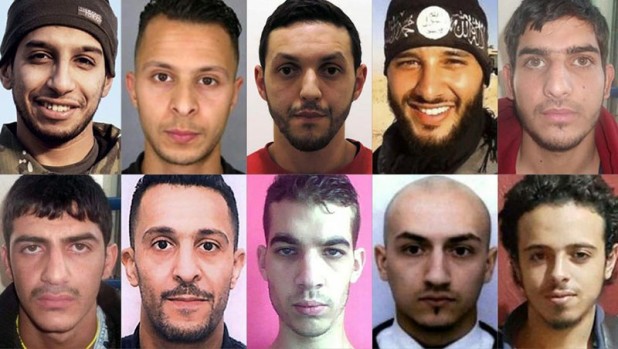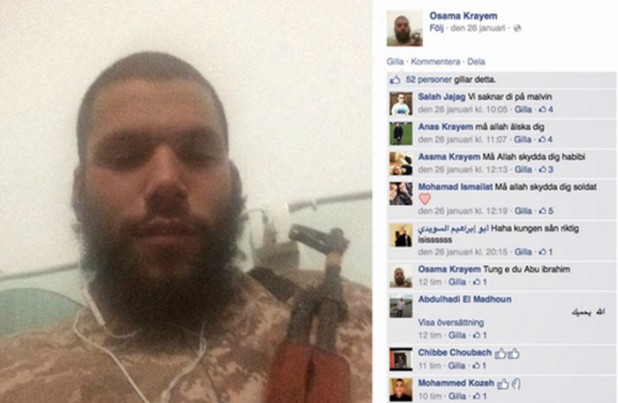The New Observer
April 10, 2016
The capture of six nonwhite “immigrant” terrorists—including one of the fugitive Brussels airport bombers—was only one of a series of such arrests the past two weeks which took place in Denmark, Germany, the Netherlands, and Britain.
The raft of arrests beg the question: how many more such incidents must occur before it is acknowledged that nonwhite “immigration” is a security threat?
The arrest of Mohamed Abrini—who played a major role in the November 2015 Paris attacks in which 130 were killed, and the March 2016 Brussels bombings in which 32 died—and three other nonwhites in an operation in Brussels on Friday April 8, has dominated the headlines, but has obscured the fact that at least a dozen more nonwhite immigrant-terrorists have been arrested this week in Europe.
Significantly, the three nonwhite “immigrants” arrested along with Abrini were identified by Belgian police as Herve BM, an African with Rwandan nationality; Bilal EM, and Osama K.
Bilal EM is a legal resident and citizen of Belgium, and Osama K—whose full name was reported later as Osama Krayem, is a legal immigrant to Sweden and holds Swedish nationality.
Krayen has been identified as being present at the time of the metro train attack in Brussels, while Abrini has been identified as the infamous “man in the hat” of the airport bombing in that city.
Krayem, from Malmo, Sweden, like Abrini, survived the Brussels attacks, by not blowing himself up like his compatriot, the Moroccan Khalid El-Bakhroui—who held Belgian nationality.
Krayem posted a picture of himself wearing combat gear and holding an AK-47 on Facebook in January 2015, saying he had joined ISIS. The picture was apparently taken in Deir ez-Zor in Syria.
Having fought with ISIS in Syria, Krayem then came back into Europe along with the flood of nonwhite invaders in 2015, landing on the Greek island of Leros in September.
Carrying a false Syrian passport in the name of Naim El-Hamed, he made his way to an invader center in Germany, where Paris attacker Salah Abdeslam collected him on October 3 and brought him back to Brussels.
Meanwhile in Denmark on Thursday, April 7, Copenhagen police arrested seven more nonwhites on charges of having served with ISIS in Syria. A number of weapons and ammunition was seized during the raids in the Danish capital city.
According to the Danish Radio broadcaster, four of the original arrestees have known connections to Copenhagen’s increasingly nonwhite criminal gangs in the Vejledalen neighborhood on the city’s southwest outskirts.
The Danish government earlier expressed concern that violent gang members who have become “radicalized” could carry out an attack similar to the one in Copenhagen in February 2015, in which a Palestinian “immigrant” with Danish citizenship killed a filmmaker and a security guard in attacks that were inspired by the deadly assault by a large nonwhite gang on the French satirical weekly Charlie Hebdo magazine.
Like the latest arrests, the Palestinian was also known to Danish police as a criminal in Copenhagen.
On April 7, German police arrested a 29-year-old Nigerian and a 46-year-old Iraqi in Munich, one at a sports betting shop near the central train station and the other at an S-Bahn train station, on suspicion of being connected to ISIS.
Both of the arrestees’ names were on a stolen list of 22,000 ISIS members leaked from that organization last month. The Iraqi confirmed to police that he still had contact with two cousins through messaging apps on his smart phone—and that one of his contacts was still in Iraq while the other was currently in Greece waiting permission to come to Germany.
The two nonwhites were released on Friday after police were unable to prove or disprove the allegations, but were placed under monitoring while the police continue their investigations, media reported.
On April 6, two nonwhites were arrested in London for links to a Turkish terrorist group. The arrests relate to the terrorism movement the Revolutionary People’s Liberation Party (DHKP-C). The DHKP-C is part of a terrorist movement that has claimed responsibility for the deaths of police officers, soldiers, and dozens of civilians in Turkey and Europe since the late 1970s.
On April 4, British police arrested two more nonwhites, a 24-year-old male at Gatwick airport and a 20-year-old female in west London. The two arrests were both in relation to “Syria-related terrorism offences,” a police statement said.
The male was detained by counterterrorism officers before boarding a flight bound for the Middle East. The pair are now being held at a police station in the West Midlands and searches were carried out at two addresses in nonwhite immigrant-overrun parts of Birmingham.
On Sunday, March 27, Dutch anti-terrorism police arrested four nonwhites with French nationality in Rotterdam, on suspicion of preparing an attack on France.
Dutch prosecutors said that among those others arrested, two were aged 43 and 47, and had “Algerian backgrounds.”
One of the arrested men was identified as Anis B., who has links to Reda Kriket, the nonwhite immigrant-terrorist arrested in the Paris suburb of Argenteuil on March 24. Kriket is accused of being at an “advanced stage” of planning a terrorist atrocity in France for ISIS.
Kriekt was also part of a large network led by now imprisoned Moroccan-born Khalid Zerkani, who, during his trial, was described by Belgian prosecutors as the country’s “biggest recruiter” of jihadist fighters.
On Friday, March 29, Belgian police arrested five nonwhites, identified as Rabah N., Abderamane A., Yassine A., Mohamed B., and Aboubaker O., for “participating in terror activities.” All are of North African origin.
On March 19, Italian police arrested an Algerian national in a probe into fake IDs used by the Paris attackers. The suspect, identified as Djamal Eddine Ouali, has refused to speak. Brussels prosecutors said the fake documents were “probably” also used by Salah Abdeslam, the sole surviving Paris attacks suspect, who was arrested in Brussels on March 18.
The list goes on and on—and it is clear that the policy of promoting mass Third World immigration has created not only great social disturbance in Europe, but also a continent-wide security threat, as the chaos and violence of the Third World has been imported into the heart of Europe.
 Daily Stormer The Most Censored Publication in History
Daily Stormer The Most Censored Publication in History




